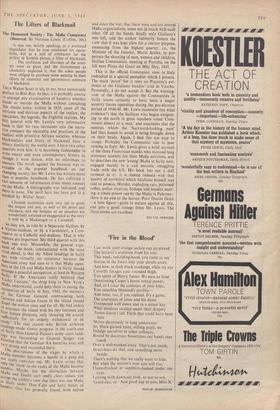The Lifters of Blackmail
It was not, strictly speaking, as a professed depredator that he now conducted his opera- tions, but as a sort of contractor for the police; in Scottish phrase, a lifter of blackmail. . . . The confusion and disorders of the coun- try were so great, and the Government so absolutely neglected it, that the sober people were obliged to purchase some security to their efforts by shameful and ignominious contracts of blackmail.
Tutus Walter Scott in his, to me, most memorable preface to Rob Roy. In fact, it is probably unwise to attempt any examination of banditry whether inside or outside the Mafia without consulting this classic essay, written in 1829, upon all the intricate and devious aspects of the outlaw, the anecdotes, the legends, the frightful realities. My first quarrel with Mr. Lewis's very informative book is that his rare intrusions into the narra- tive compare the mentality and practices of the mafiosi with primitive African societies, whereas blackmailers and lifters of blackmail have a dreary similarity the world over. I have two other quarrels with him. It is becoming fashionable to write recent and even contemporary history as though it were fiction, with no references to sources. The revolt against the footnote was in- evitable in the popular handbook on our Changing society', but Mr. Lewis has written more than a popular handbook. He has collected a vast amount of information from many sources on the Mafia. A bibliography was indicated, and there is none. The peril here has been put in a nutshell by Walter Scott : Clannish partialities were very apt to guide the tongue and pen, as well as the pistol and claymore, and the features of an anecdote are Wonderfully softened or exaggerated as the story is told by a MacGregor or a Campbell.
So they are, as told by a Separatist Sicilian, by a Vizzini-mafioso, or by a Carabinicri, a Com- munist or a Catholic anti-mafioso. That is why book are important. My third quarrel with this °GO can. wait. Meanwhile, the general argu- Mein of the book, substantiated with the most vivid detail, is that the Allied landings in Sicily }net with virtually no resistance because the American army had seen to it that Mafia mem- bers in the US and Mafia leaders in Sicily should arrange a.peaceful occupation, at least in Western Sicily. If the Americans really believed that `ducky Luciano,' the drug king in New York's Mafia underworld, could help them in easing the occupation of Sicily in July, 1943, the memoirs °F,- the German General commanding both German and Italian forces in the island should dispel the notion once and for all. He had orders `„° evacuate the island with his two German and lour Italian divisions, only 'delaying the assault s1.ifliciently for an orderly withdrawal to be made.The real reason why British airborne ill of made slower progress in the south-cast 4 "Sicily than General Patton's army coast land- '.o8s was (according to General Senger von vtterlin) that the German AA batteries were still Cry strong and successful there.
_The descriptions of the stages by which a 'walla member becomes a bandit in a gang did
11(n really convince me. Mr. Lewis writes that (.)111Y the 'trash' in the ranks of the Mafia become bandits. Maybe, but the distinction between Mafia and bandit isn't really clear, unless you accept the author's view that there was one Mafia in c icily under Don Cale and forty bands of bas ndus. One has generally found, both before
and since the war, that there were and are several Mafia organisations, some not in touch with each other. Of all the bands, finally only Giuliano's was left, and the author indirectly fosters the view that it was kept alive for a sinister purpose, emanating from the highest quarter, i.e., the Minister of the Interior, Mario Scelba, to per- petrate the shooting of men, women and children, Sicilian Communists, meeting at Portella, on the hill near Piana dei Greci on May Day, 1947.
This is the official Communist view in Italy embodied in a special pamphlet which I possess. The main 'proof' for it rests on Pisciotta's evi- dence at the Giuliano bandits' trial in Viterbo. Personally, I do not accept it. But the winning- over of the Mafia against the Communists in Sicily seems certainly to have been a major security forces operation during the pre-election period of 1946-48. Mr. Lewis maintains (on what evidence?) that the Sicilians who began emigrat- ing to the north in great numbers voted 'Com- munist almost to a man,' and concludes that the nemesis which the 'backward-looking men' had thus hoped to avoid is being brought down on their heads. Again, I find this not easy to accept. Probably the Communist tide is now turning in Italy. Mr. Lewis gives a brief account of the three Franciscan monks who received long sentences recently for their Mafia activities, and he describes the new 'young' Mafia in Sicily now, engaged mainly in a vast narcotic smuggling trade with the US. His book has not a dull moment in it: it is indeed imbued with that quality of terribiiita which Giuliano himself was said to possess. Murder, exploding cars, poisoned coffee, police rivalries, bishops and bandits meet- ing, a whole prison run by the Mafia in Palermo: there is no end to the horror. Poor Danilo Dolci —a lone figure—gains in stature against all this, and gets a good innings from Mr. Lewis. The illustrations are excellent.
SYLVIA SPRIGGS






































 Previous page
Previous page